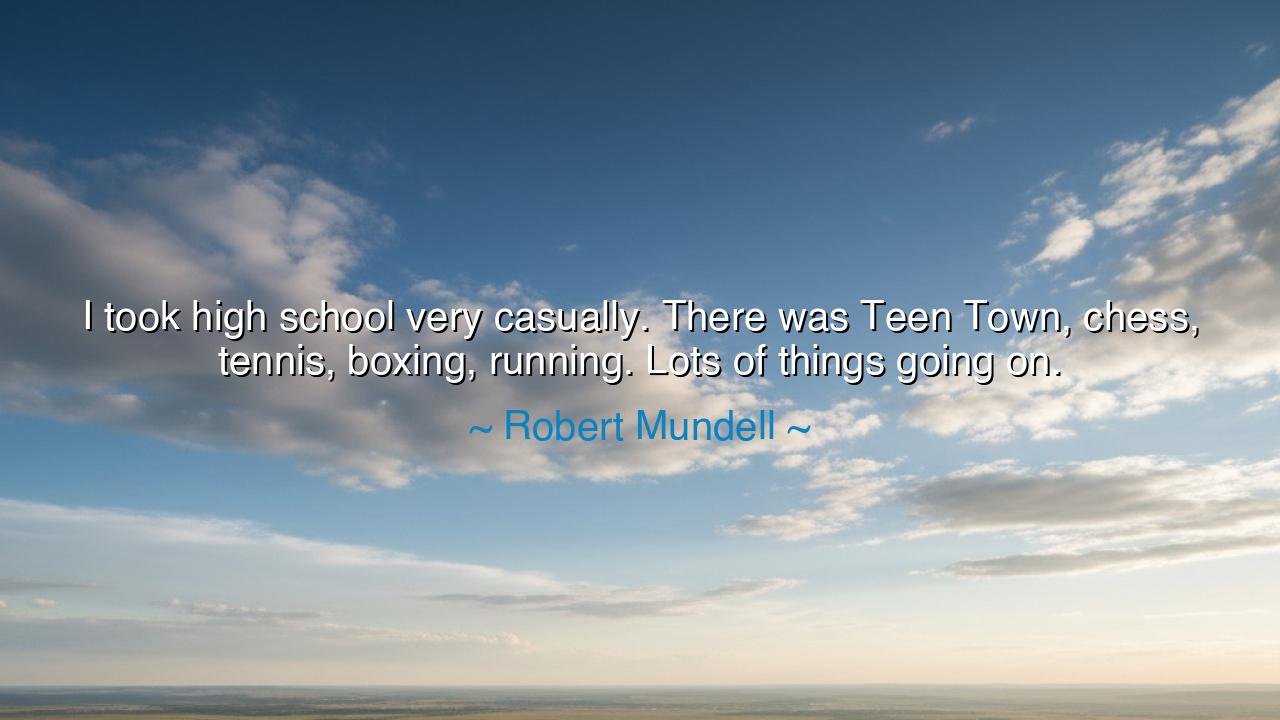
I took high school very casually. There was Teen Town, chess
I took high school very casually. There was Teen Town, chess, tennis, boxing, running. Lots of things going on.






Robert Mundell, the father of the euro and a giant among modern economists, once looked back upon his youth and said: “I took high school very casually. There was Teen Town, chess, tennis, boxing, running. Lots of things going on.” In these words, spoken with a tone of simplicity, there is hidden a profound reminder: that even those who later change the course of history may not burn with seriousness in their early years. The seeds of greatness often germinate not in strict discipline alone, but in the broad soil of play, curiosity, and varied pursuits.
Mundell’s casual approach to high school reflects the freedom of a mind not yet bound by the rigid measures of success. Rather than being consumed with the weight of exams and grades, he allowed himself to wander through many fields—games of intellect, like chess, and trials of the body, like boxing and running. This is no confession of laziness, but of balance. It shows that youth need not be a prison of textbooks, but a wide horizon where mind and body, social joy and private challenge, can grow together.
The ancients, too, valued this broadness. The Greeks called it paideia, the full education of a person—not merely in arithmetic or letters, but in music, athletics, philosophy, and civic life. Socrates himself walked the gymnasiums of Athens not only to debate but to exercise, believing that the cultivation of the soul must be joined with the training of the body. So it is with Mundell: his later brilliance in economic theory was not born in isolation, but in the fertile ground of a youth that embraced both sport and thought, play and reflection.
History offers us an example in the life of Leonardo da Vinci. As a boy, he was not chained to one discipline but dabbled in painting, sculpture, anatomy, engineering, and even music. To many, he might have seemed unfocused. Yet it was this very wandering spirit that made him a universal genius. Mundell’s recollection of his own casual youth reflects the same truth: that great minds often begin as wide seekers, not narrow specialists. What appears casual may, in truth, be preparation for extraordinary synthesis later in life.
From this, a lesson arises for all: do not despise the days when your path seems scattered, when your youth is spent tasting many things rather than mastering one. For these experiences enrich the soul, broaden the mind, and prepare hidden connections that will serve you in ways unseen. Mundell’s Teen Town, chess, tennis, boxing, running may seem like diversions, yet they gave him rhythm, discipline, strategy, endurance, and social bonds—all of which strengthen the architect of ideas.
Practical wisdom follows. If you are young, do not think that every moment must be consumed with the weight of future ambition. Allow yourself space to explore, to play, to join with others in community, to sharpen your mind in games, to strengthen your body in sport. If you are older, do not look back on your casual youth with regret, but with gratitude—for those moments gave you a foundation more subtle and enduring than grades alone.
Thus, children of tomorrow, hear this truth: a casual beginning need not mean a wasted one. The river that flows gently at first may gather force as it moves, becoming mighty as it nears the sea. Mundell’s life, crowned with the Nobel Prize, testifies that greatness may arise from youth spent widely, joyfully, curiously. So embrace the “lots of things going on,” and trust that the weaving of many threads may one day form a tapestry beyond imagining.






AAdministratorAdministrator
Welcome, honored guests. Please leave a comment, we will respond soon